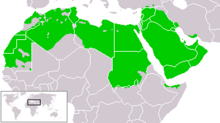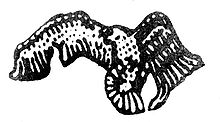Watan
Watan ( Arabic وطن, DMG waṭan , plural autan /أوطان / auṭān ) is an Arabic word. The term means something like “fatherland”, “homeland” or “nation” and plays a major role in Arab politics in the 20th and 21st centuries.
The term al-watan al-ʿarabi / used by the Ba'ath Party and other Arab nationalists /الوطن العربي / al-waṭan al-ʿarabī is usually translated as "The Arab homeland" or "Arab homeland" . It refers to the entirety of the Arab world or all Arab countries within the Arab League .
In contrast, the name Türk vatanı is the Turkish homeland .
Arab fatherland
The use of Arabic terms, which are used as counterparts to the political categories of nation, people and fatherland , is not uniform; among other things, Arabs of different political orientations (e.g. Lebanese, Greater Syrian, Pan-Arab nationalists) use the common terms differently, which occasionally contributes to confusion, not just among non-Arab orientalists . One of the reasons for this problem is that after the collapse of the Ottoman Empire in World War I, several successor states emerged from the Ottoman Arab provinces in the Middle East within the borders drawn by the French and British colonial rulers. The use of “national” terms varies depending on whether these small units are viewed as legitimate units and consequently as independent nations or only as part of a comprehensive unit.
The goal of the pan-Arab nationalists is Arab unity, see Arab striving for unity and pan-Arabism , i. H. the unity of the Arabic-speaking countries, regardless of the peoples living in them.
The conceptual history of watan and the differentiation from other terms is therefore not clear. Watan basically refers to a fatherland or a nation in which different groups, including national or religious minorities, live together. The counterpart to this is the term qawm, understood in a nationalistic sense as a community of Arabs. In communist and socialist Arab parties that criticized Arab nationalism as having a tendency to be racist, the term watan was therefore common. It was only since 1967 that they increasingly propagated “Arab unity” as a political union of Arab countries. In addition to watan and qawm, the term umma exists as an expression of community concept. Umma occurs in the Koran and therefore basically has a religious connotation, but is nevertheless used for small and large-scale “nations”. B. spoken of the "Syrian" or "Arabic" umma. In Syria in particular, an irredentist party emerged with the Ba'ath Party, which saw Syria as merely a rump state and which not only called for an amalgamation with neighboring states, but potentially with all Arab countries.
The first Hizb al-watani ( Fatherland Party , sometimes also translated as National Party ) was founded by Young Egyptians in 1879 and 1908 , parties of the same name were founded in Iraq and Syria in 1922 and 1925 (1937 also in Morocco, 1950 in Jordan, 1952 in Sudan and 1956 in Kuwait) and other countries.
Pan-Arab nationalists, e.g. B. the Ba'ath Party, use the word qutr , which actually means "region" or "area", for the individual Arab countries, which calls into question the integrity of the individual states. For example, there was only one national leadership of the Ba'ath Party, it was responsible for the entire Arab fatherland and dealt with national issues. In contrast, the numerous regional directors only deal with regional affairs in their countries. The adjective qutri, which means “provincial” or “regional”, is associated with a specific Arab country. Instead of al-aqtar al-ʿarabiyya for “the Arab countries”, al-bilad al-ʿarabiyya is used, which as al-buldan al-ʿarabiyya also means “the Arab countries”. The adjective qawmi means "national" or "nationalistic". The nationalists use this expression when they speak of the entirety of the Arab countries. Antun Saadas 1932 founded al-Hizb al-Qawmi therefore saw himself as a nationalist , later as a social nationalist party (often erroneously with People's Party translated), but said no allarabische but a supposedly großsyrische nation. The harakat al-qaumiyyīn al-ʿarab saw itself as a movement of Arab nationalists .
Turkish fatherland
The term watan is used as vatan or vätän / vətən in the Turkish language and in the languages of other Turkic peoples , both for the national fatherland and for the common utopian fatherland; see Pan-Turkism .
It is used z. B. on behalf of the Fatherland Party ( Anavatan Partisi , ANAP ) of Turkey or Azerbaijan. Often the name is translated as “ motherland party ”, as the word is formed from “ana” (mother or also main) and “vatan” (in German fatherland). An appropriate translation would be the main fatherland party. The strongest party loyal to the President in the parliament of the largest Turkic Republic of Kazakhstan is called Nur Otan ( otan regional for vatan ) or Republican Fatherland Party . A small Patriotic Progressive Party is represented in the parliament of the Turkic Republic of Uzbekistan .
Among the Turkic peoples, the term “fatherland” refers more to the mother, which is why Turkey is usually also referred to as Anavatan (roughly: motherland).
Others
Before it was overthrown in 1992, the former Communist Party of Afghanistan had renamed itself Hizb-e-Watan , Fatherland Party , in 1988 and 1990 respectively. “Al Watan parties” are active in several Arab countries, for example in Tunisia , Libya and Egypt , which were founded during or after the 2011 Arab Spring .
“Al-Watan al-ʿArabi” is a weekly magazine in Arabic that mixes current affairs from politics and society with a little entertainment. It is published in Paris, but can also be subscribed to in Germany. There are also newspapers in Saudi Arabia and Syria with the name "al-Watan"
As al-Majlis al-Watani (only be complied with National Assembly or National Assembly translatable, rather Patriotic Assembly ), the in several Arab states state parliament designates a significant departure from transnational and nationalist claims, see list of parliaments .
The translation "National Assembly" only fits the Turkish Grand National Assembly (Türkiye Büyük Millet Meclisi), which does not use the term Vatan (whether it is mother or fatherland), but mainly met in 1920 to expressly reject its threatened division.
In numerous national anthems of Arab or predominantly Islamic countries, the term "Watan" appears in the title or in the lyrics, for example in the hymns of Lebanon , Sudan and the old hymn of Iraq , as well as in the motto of the Kingdom of Morocco .
In India, too, at the time of the struggle for independence, the Arabic Urdu term “Watan” for father or mother country came into fashion. Especially among the supporters of the Congress Party, who were influenced by socialism, but also the later Indian government in exile of free India (Azad Hind), who saw India as a state in the tradition of the Mughal Empire and advocated Hindustani (de facto Urdu) as the national language, which uses many terms from Persian and Arabic. In India's officially adopted national language Hindi, “homeland” is called “Svadesh” and “motherland” is called “Matribhumi”.
literature
- Elias Farah : The Arab Fatherland after World War II. Varese 1977.
See also
- Watan Group (Afghan group of companies)



